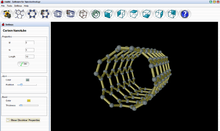Ninithi

A screenshot of Ninithi software
Ninithi (Sinhala: නිනිති) is free and open source modelling software that can be used to visualize and analyze carbon materials used in nanotechnology. Users of ninithi can visualize the 3D molecular geometries of graphene/nano-ribbons, carbon nanotubes (both single wall and multi-wall) and fullerenes. Ninithi also provides features to simulate the electronic band structures of graphene and carbon nanotubes.[1] The software was developed by Lanka Software Foundation,[2] in Sri Lanka and released in 2010 under the GPL licence. Ninithi is written in the Java programming language and available for both Microsoft Windows and Linux platforms.
Generalized equations and algorithms used in ninithi were published in 2010.[3]
References
- ↑ "Resources: ninithi". NanoHUB.org. Retrieved 2013-11-23.
- ↑ "Fueling FOSS in Sri Lanka |". Opensource.lk. 2011-01-18. Retrieved 2013-11-23.
- ↑ "IEEE Xplore - 3D Modelling of Carbon Allotropes Used in Nanotechnology". Ieeexplore.ieee.org. 2010-05-28. doi:10.1109/AMS.2010.97. Archived from the original on December 2, 2013. Retrieved 2013-11-23.
External links
- Article on ninithi at ITPro magazine
- Ninithi at Manthan Awards, India
- Ninithi at nanoHUB.org maintained by Purdue University
- Download links for Ninithi
- Ninithi project page at sourceforge
This article is issued from
Wikipedia.
The text is licensed under Creative Commons - Attribution - Sharealike.
Additional terms may apply for the media files.